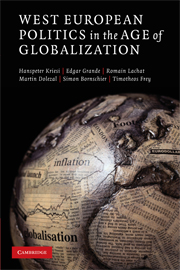Book contents
- Frontmatter
- Contents
- List of figures
- List of tables
- Preface and acknowledgments
- Part I Theory and methods
- Part II Country studies
- Part III Comparative analyses
- 10 Demand side: dealignment and realignment of the structural political potentials
- 11 Supply side: the positioning of the political parties in a restructuring space
- 12 The electoral consequences of the integration–demarcation cleavage
- 13 Globalizing West European politics: the change of cleavage structures, parties and party systems in comparative perspective
- Appendix A Technical appendix
- Appendix B Detailed statistical results
- References
- Index
13 - Globalizing West European politics: the change of cleavage structures, parties and party systems in comparative perspective
Published online by Cambridge University Press: 05 September 2012
- Frontmatter
- Contents
- List of figures
- List of tables
- Preface and acknowledgments
- Part I Theory and methods
- Part II Country studies
- Part III Comparative analyses
- 10 Demand side: dealignment and realignment of the structural political potentials
- 11 Supply side: the positioning of the political parties in a restructuring space
- 12 The electoral consequences of the integration–demarcation cleavage
- 13 Globalizing West European politics: the change of cleavage structures, parties and party systems in comparative perspective
- Appendix A Technical appendix
- Appendix B Detailed statistical results
- References
- Index
Summary
Globalizing West European politics: dimensions of comparative analysis
Has globalization resulted in a fundamental change of West European politics, its cleavage structures, parties and party systems? Although globalization has been one of the most important topics in social science research over the past decade, this question has thus far been widely neglected. In political science, most attention has been paid to the empirical analysis of the consequences of economic globalization on national state capacities and policies (e.g. Scharpf and Schmidt 2000a, 2000b; Weiss 2003) and to efforts at establishing new transnational institutions and organizations able to regulate effectively a rapidly globalizing capitalism (Zürn 1998; Held et al. 1999; Held 2004; Slaughter 2004; Grande and Pauly 2005). The impact of globalization on politics has received hardly any attention. This holds true in particular for political parties. While there are some studies on the reactions of interest groups to globalization (Zürn and Walter 2005; Streeck et al. 2006) and on the transnational organization of social movements (della Porta, Kriesi and Rucht 1999; Smith and Johnston 2002; Tarrow 2005; della Porta and Tarrow 2005), a systematic comparative analysis of the consequences of globalization on political cleavage structures, political parties and party systems is missing. Conventional wisdom still holds that political parties, their ideological profiles, their organizational capacities and their strategic interactions are all determined by domestic factors.
- Type
- Chapter
- Information
- West European Politics in the Age of Globalization , pp. 320 - 344Publisher: Cambridge University PressPrint publication year: 2008
- 2
- Cited by



